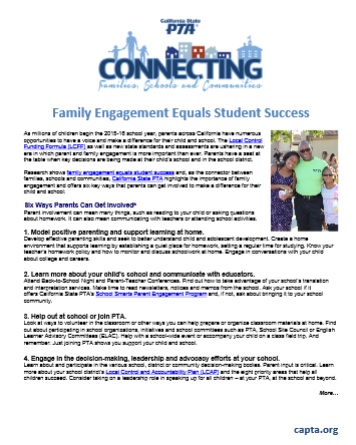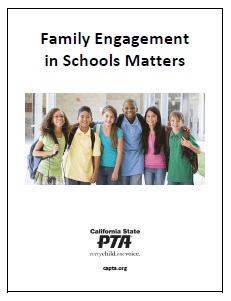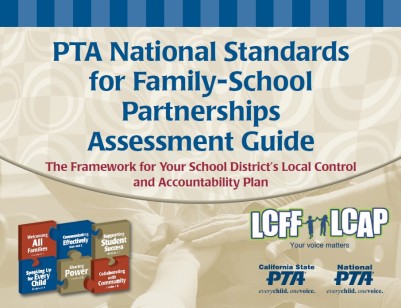 Download:
Download:
Interest: Family Engagement
Family Engagement Guide for PTA Leaders
This Family Engagement Guide contains information on why family engagement in schools matters, how to grow family-school partnerships to enhance student achievement and ways to support student success and learning at home. Throughout the resource, the word “parent” refers to parents, guardians and caregivers who have the primary responsibility for raising children and are involved in their development, learning and growth.
 Download:
Download:
Supporting Learning at Home
Working together, parents and teachers give kids their best chance to learn. The California Teachers Association and the California State PTA have joined forces to offer some tips for you that will give your children the best opportunity to succeed in school.
 Download the information, available in multiple languages:
Download the information, available in multiple languages:
PTA National Standards for Family-School Partnerships
 The PTA National Standards for Family-School Partnerships Assessment Guide is based on extensive research over the past 20 years. It was developed with the guidance and support of prominent education leaders and practitioners in the field of family engagement across the country. It provides specific goals for each of six accepted family engagement standards, as well as indicators for measuring whether those goals are being met.
The PTA National Standards for Family-School Partnerships Assessment Guide is based on extensive research over the past 20 years. It was developed with the guidance and support of prominent education leaders and practitioners in the field of family engagement across the country. It provides specific goals for each of six accepted family engagement standards, as well as indicators for measuring whether those goals are being met.
PTA recommends that every school district’s Local Control and Accountability Plan (LCAP) seeks to address each of the standards and that the various indicators be used to facilitate local conversations among parents and educators about how best to build stronger family-school partnerships and measure progress based on the priorities and needs of the community.
Download the complete Assessment Guide. (Also available in Spanish.)
More resources at are available at pta.org/nationalstandards.